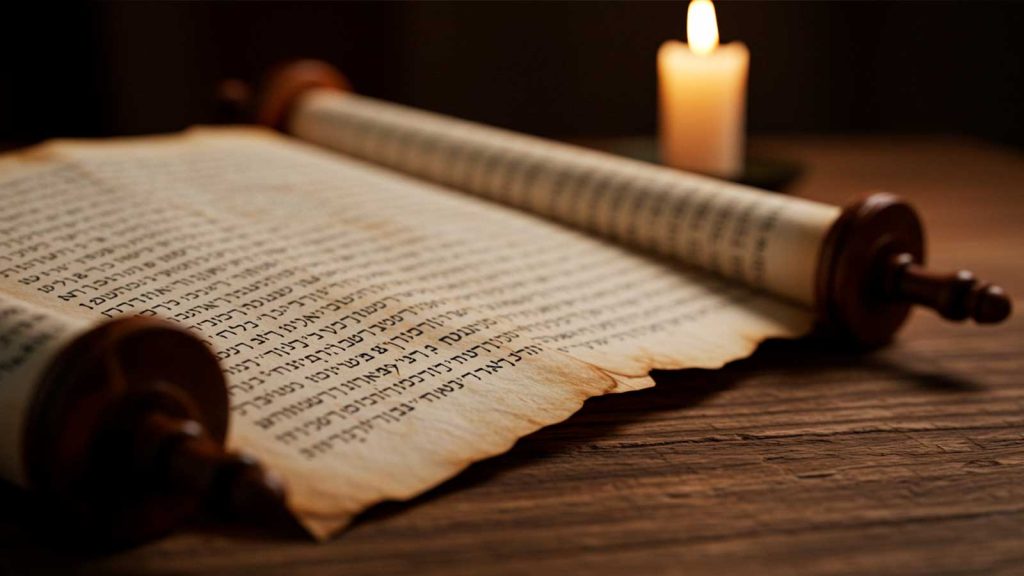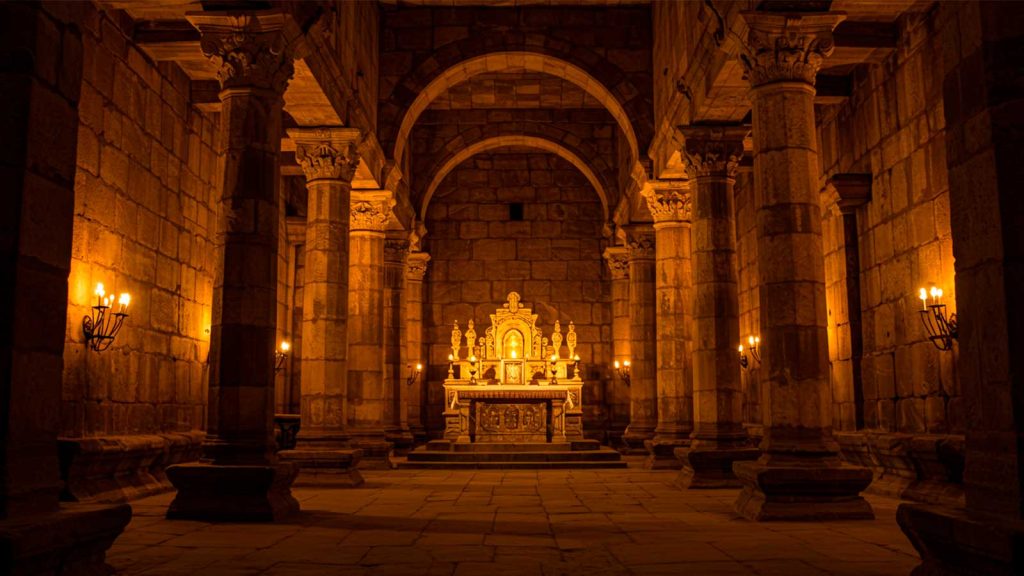Psalm 76 is one of the most powerful and symbolic texts in the Book of Psalms. It celebrates the majesty and power of God, showing how He is feared among the nations and exalted among the faithful. From the very first verses, Psalm 76 highlights divine greatness, leading readers to reflect on God’s justice, protection, and sovereignty.
Psalm 76 Complete
¹ God is known in Judah; His name is great in Israel.
² His tabernacle is in Salem, and His dwelling place in Zion.
³ There He broke the flashing arrows, the shield, the sword, and the battle. (Selah)
⁴ You are more glorious and excellent than the mountains of prey.
⁵ The stout-hearted were plundered; they sank into their sleep, and none of the warriors could lift their hands.
⁶ At Your rebuke, O God of Jacob, both chariot and horse lay stunned in deep sleep.
⁷ You — yes, You — are to be feared; and who can stand before You when once You are angry?
⁸ From heaven You pronounced judgment; the earth feared and was still,
⁹ when God arose to judge, to save all the meek of the earth. (Selah)
¹⁰ Surely human wrath shall praise You; with the remnant of wrath You gird Yourself.
¹¹ Make vows to the Lord your God and pay them; let all who are around Him bring gifts to the One to be feared.
¹² He breaks the spirit of princes; He is awesome to the kings of the earth.

Psalm 76 Explained – Verse by Verse
Psalm 76:1
¹ God is known in Judah; His name is great in Israel.
This verse declares that God is widely known and revered in Judah and Israel. His fame is not limited to a single village or small group — the whole nation recognizes Him as great and mighty.
Psalm 76:2
² His tabernacle is in Salem, and His dwelling place in Zion.
The psalmist reminds us that God chose to dwell in Salem (the ancient name of Jerusalem) and in Zion. This highlights the holy city as a special place where God manifests Himself and where His people worship Him.
Psalm 76:3
³ There He broke the flashing arrows, the shield, the sword, and the battle. (Selah)
In this verse, Psalm 76 exalts God’s power to defeat weapons and strategies of war. He breaks arrows, shields, and swords, showing that victory does not depend on human strength but on His divine intervention.
Psalm 76:4
⁴ You are more glorious and excellent than the mountains of prey.
The psalmist describes God as more glorious and imposing than the mountains, which often symbolized places of hunting and earthly power. No natural or human symbol can compare with divine majesty.
Psalm 76:5
⁵ The stout-hearted were plundered; they sank into their sleep; none of the warriors could lift their hands.
Even the bravest and strongest warriors are defeated by God. They are reduced to inactivity, as if asleep, unable to use their hands to fight.
Psalm 76:6
⁶ At Your rebuke, O God of Jacob, both chariot and horse lay stunned in deep sleep.
Here God is portrayed as the One who, with a single word of rebuke, can topple entire armies — including war chariots and horses — casting them into a “deep sleep,” completely nullifying their power.
Psalm 76:7
⁷ You — yes, You — are to be feared; and who can stand before You when once You are angry?
Psalm 76 affirms that no one can withstand or survive God’s judgment. When He is angry, His authority is absolute, and all humanity must fear Him.
Psalm 76:8
⁸ From heaven You pronounced judgment; the earth feared and was still,
The psalmist describes how God’s judgment is proclaimed from heaven, causing fear and silence on earth. Everything becomes still in the presence of His decision.
Psalm 76:9
⁹ when God arose to judge, to save all the meek of the earth. (Selah)
This verse reveals the purpose of divine judgment: to deliver the meek, the humble, and the righteous. God intervenes to protect those who trust in Him.
Psalm 76:10
¹⁰ Surely human wrath shall praise You; with the remnant of wrath You gird Yourself.
The psalmist notes that even when people are filled with anger, it ends up exalting God, because He controls and limits all human rage according to His purposes.
Psalm 76:11
¹¹ Make vows to the Lord your God and pay them; let all who are around Him bring gifts to the One to be feared.
Here the people are exhorted to fulfill their vows and bring offerings to God. The verse underscores the importance of honoring God with actions and gifts, acknowledging His greatness.
Psalm 76:12
¹² He breaks the spirit of princes; He is awesome to the kings of the earth.
The psalm concludes by emphasizing that even princes and kings are not above God’s power. He can overthrow leaders and exercise judgment over all, revealing Himself as awesome before human authorities.

Historical Context of Psalm 76
Psalm 76 was written in a special context of victory and celebration, portraying God as Israel’s great defender. It is considered one of the most striking psalms exalting divine providence, and its historical background helps us grasp its depth even more fully.
A Moment of Supernatural Victory
Many scholars believe that Psalm 76 refers to the famous defeat of the Assyrian army led by Sennacherib, recorded in 2 Kings 18–19 and Isaiah 36–37. Jerusalem was besieged and on the verge of destruction, but God intervened miraculously, sending His angel to annihilate thousands of enemy soldiers overnight. This extraordinary victory became a symbol of God’s care and power.
Zion: The City Chosen by God
The psalm exalts Zion, another name for Jerusalem, as the place chosen for God’s dwelling. The text emphasizes that the city is not important merely for its walls or location, but because God decided to live there. This elevated Jerusalem to a special status among all nations, making it a living symbol of the Lord’s presence and protection.
Victories as Signs of Divine Favor
In the biblical context, military victories were not seen merely as strategic merit or the result of human power. They were understood as direct signs of God’s favor and intervention. When Israel triumphed, the people acknowledged that it was God who broke bows and swords; when they suffered defeats, it was interpreted as a spiritual warning for repentance and renewal.
Reinforcing Trust in Divine Providence
Psalm 76 served to strengthen Israel’s collective trust. By recalling moments when God protected and saved His people, the psalm renewed the hope that, regardless of the strength of their enemies, safety came solely from the Lord. He was not merely a local king but the sovereign over all nations.
Liturgical Memory and National Identity
Beyond its theological message, Psalm 76 functioned as a liturgical marker. Sung and recited in community gatherings, it reinforced Israel’s spiritual and national identity, constantly reminding them that they were guarded and led by the true God. This collective memory strengthened faith and united the nation in praise and commitment.
Structure and Main Themes of Psalm 76
Psalm 76 has sections that address different aspects of the relationship between God and His people. Let’s explore each of these themes.
Psalm 76: God Is Known in Judah
God is known in Judah; His name is great in Israel.
This verse underscores God’s fame and authority among the people. Psalm 76 shows that not only Judah but all Israel acknowledges divine greatness, proving that His presence transcends regions and borders.
Psalm 76: Zion, the Place of Divine Presence
In Salem is His tent, and in Zion His dwelling place.
Zion is Israel’s spiritual center. Psalm 76 emphasizes that God chose this city as His dwelling, making it a symbol of safety, protection, and hope for the people.
Psalm 76: God’s Power Over the Enemies
There He broke the arrows of the bow, the shield, the sword, and the battle.
Psalm 76 displays God’s absolute power over Israel’s enemies. He can destroy weapons, plans, and armies, showing that no human force compares with divine sovereignty.

The Spiritual Meaning of Psalm 76
Psalm 76 goes beyond a simple historical narrative. It carries a profound spiritual meaning, inviting readers to trust fully in God and to recognize His mighty hand at work in their lives.
Psalm 76: God as the Supreme Judge
You — yes, You — are to be feared; and who can stand before You when You are angry?
This passage reminds us that God is the supreme judge before whom all must bow. He dispenses true justice, and when He rises in indignation, no adversary can resist.
Psalm 76: The Humbling of the Proud
From heaven You pronounced judgment; the earth feared and was still, when God arose to judge.
Psalm shows that human arrogance is silenced before divine judgment. This verse reveals God’s sovereignty, able to quiet every voice and bring true peace to the world.
Applying Psalm 76 to Daily Life
Psalm 76 is not just an ancient text; it offers important applications for those seeking to strengthen their faith and face daily challenges.
Trusting in Divine Protection
Psalm 76 teaches that even in the face of threats and adversities, we can fully trust God’s protection. He is the defender of the righteous and the guardian of nations.
Cultivating Humility
By recognizing God’s greatness, Psalm invites us to cultivate humility. We should remember that every human achievement only has value when aligned with the divine will.
Praising God with Reverence
Psalm 76 is also a call to praise. It inspires us to worship God with reverence, acknowledging His power and goodness at every moment of life.
Valuable Lessons from Psalm 76
Psalm 76 is not just a text of exaltation to God; it also offers precious lessons that can transform how we live, think, and relate to the divine and to others. Let’s delve into these lessons.
The Fear of the Lord
Psalm 76 clearly shows that the fear of the Lord is the beginning of true wisdom. This fear should not be confused with irrational dread, but understood as profound respect, reverence, and admiration for God’s authority and holiness.
When we recognize divine greatness, we understand our own place before Him: we are limited, dependent, and grateful creatures. This fear teaches us to be prudent in our decisions, to avoid proud attitudes, and to cultivate a life of humility and gratitude.
Through this recognition we learn to align our values, desires, and choices with God’s will, living more integrously and wisely.
Divine Sovereignty
Psalm 76 powerfully reinforces that God is sovereign over all things. He does not rule only Judah or Israel; He reigns over every nation, over the whole earth, and over all creatures. This means no situation is beyond His control, no ruler is stronger than He, and nothing happens without His knowledge.
For believers, this sovereignty is an invitation to complete trust. Even when circumstances appear chaotic or unjust, Psalm 76 reminds us that God has the final say and that His justice will prevail at the right time.
This lesson encourages us to hand over our worries and not despair in difficulties, because He is the One who sets the destiny of peoples and directs history toward His purposes.
The Importance of Corporate Praise
Psalm 76 beautifully highlights the importance of praising God in community. Corporate worship is not simply an empty ritual or an ancient tradition — it is deeply valuable for strengthening personal and collective faith.
When the faithful gather to exalt God, they are spiritually renewed, mutually encouraged, and reaffirm their identity as God’s people. This collective praise generates unity, a common purpose, and shared hope.
Moreover, the community becomes a living testimony to the world, showing that God is worthy of worship and that His presence transforms lives. This lesson challenges us not to neglect communal gatherings of faith, reminding us that there is power and grace when we praise together.
Curiosities About Psalm 76
- Psalm 76 is attributed to Asaph, one of the leading temple musicians.
- It is traditionally sung on occasions of celebration and victory.
- Many scholars see in this psalm a parallel between divine protection and the great deeds in Israel’s history.
FAQ About Psalm 76
What does Psalm 76 mean?
Psalm 76 exalts God’s power, showing His authority over enemies and His ability to protect Israel.
Who wrote Psalm 76?
Psalm 76 is traditionally attributed to Asaph, a Levite and temple musician.
What is the central message of Psalm 76?
The central message of Psalm 76 is that God is sovereign, just, and worthy of fear and praise.
How can I apply Psalm 76 in daily life?
We can apply Psalm 76 by trusting God, cultivating humility, and taking part in moments of corporate praise.
Why is Psalm 76 important?
Psalm 76 is important because it reminds us of divine greatness and inspires us to trust in God’s protection and justice.
Conclusion
The text we have explored is a powerful invitation to reflect on divine majesty, power, and justice. It reminds us that no matter how strong the challenges or enemies before us, a sovereign force guides and protects the righteous. More than a historical record or an ancient song, this biblical passage is still relevant, inspiring confidence, humility, and gratitude in those who seek to live according to the principles of faith.
We are also called to recognize the importance of collective praise, of deep respect for divine authority, and the awareness that everything is under higher control. May these lessons strengthen our daily walk, helping us face adversities with courage and find peace even amid the uncertainties of the world. Each time we revisit these words, we are invited to renew our spiritual commitment and exalt the One who reigns above all things.
READ ALSO:
- Psalm 75: Acknowledging Divine Justice and God’s Power
- Psalm 74: Reflections on the Divine Presence in Times of Crisis
- Hail Holy Queen Full Prayer Explained: Discover the Beauty of This Prayer
- Psalm 73: Reflections on Divine Justice and the Paths of the Wicked
FOLLOW US ON FACEBOOK
I hope you enjoyed it
Leave your message of faith below!